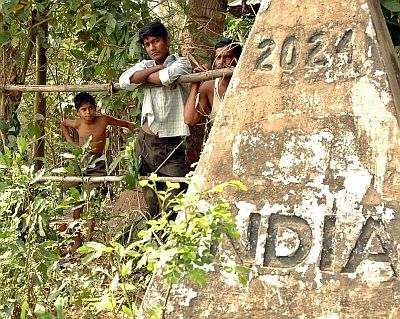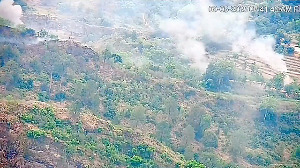 By revising the India-Bangladesh land boundary agreement, the NDA is going for short-term gains and losing the long-term perspective, says Gautam Sen.
By revising the India-Bangladesh land boundary agreement, the NDA is going for short-term gains and losing the long-term perspective, says Gautam Sen.
The Union Cabinet has cleared a Constitution amendment bill on a modified land boundary agreement with Bangladesh, excluding the exchange of enclaves and territories in adverse possession in the Assam segment.
Bangladesh’s Minister of State for Foreign Affairs Mohammad Shahriar Alam is reported tohavestated to themedia that Dhaka is not yet clear on this issue. It is clear that political compulsions of the Bharatiya Janata Party which dominates the National Democratic Alliance government,inthe context of the assembly elections in Assam next year, has driven the government to decide against an LBA as it has been originally framed to encompass the entire India-Bangladesh border. The BJP does not want to be seen as compromising on surrender of excess Indian land in Assam to Bangladesh.
Sheikh Hasina’s Awami League-lead Bangladesh government has been staving off serious political challenges from the communal Jamaat-e-Islami and its ally, Begum Khaleda Zia’s Bangladesh National Party over the past few years. With the Teesta River waters-sharing still to be formally agreed upon and the BNP bandying it as a major failure of the government, a successful LBA in its original form would be politically convenient Hasina.
The NDA government should heed wiser counsel and formally conclude the original LBA, actually having its genesis in the Indira Gandhi-Mujib Rehman agreement of 1974 without any further delay. The LBA is in India’s overall interest and a parliamentary standing committee on external affairs had unanimously recommended its early finalization in December 2014.
The LBA will bring about more stability to India-Bangladesh bilateral relations and strengthen the friendly Hasina government. Above all, such an agreement will contribute towards economic development of the enclaves, adjacent border areas and bring about a sea change in the lives of both Indians and Bangladeshi residents with provision of basic minimum services to them and back-up the law enforcement apparatus, practically non-existent at present.
Some compensatory economic measures will be required in Assam and West Bengal for Indian citizens of the enclaves which will pass on to Bangladesh. The West Bengal government has already hinted on its willingness to take on such a burden. Adjustment for some of the Bangladeshi citizens who prefer to stay on in the enclaves, which eventually get assimilated in India would also be required. The number involved would be a few thousands only and the territorial content will not be large.
The Congress-lead Assam government of Tarun Gogoi is already committed to the LBA. Gogoi was part of United Progressive Alliance Prime Minister Manmohan Singh’s official delegation to Bangladesh which agreed to the draft content of the LBA in September 2011.
It will be politically expedient for the NDA government to push through the LBA in its present form, without truncating it well before the Assam elections. West Bengal will also go to its assembly polls next year. Before competing political stances bedevil the environment, it will be prudent and in the country’s long-term interest of beneficial bilateral relations to put the LBA in the statute book of India’s international treaties. The impact of accommodating a few thousand Indian citizens of the Bangladeshi enclaves will not be very high. The BJP and the NDA should be able to manoeuvre the political situation in Assam in its favour when its government steps in with an economic resettlement package and adjustment of Bangladeshis who prefer stay on and assume Indian citizenship.
Political will and foresight on the part of New Delhi will be of the essence. From the regional geo-political perspective, in the interest of security of India’s north-east, as well as facilitating the NDA government’s ‘Act East Policy’, stable and cooperative India-Bangladesh relations will be necessary.
The Hasina government has already facilitated many of India’s infrastructural projects in the north-east by enabling road and riverine transport from mainland India through Bangladesh. A perceptibly better security scenario prevails in the north-east over the past 5-6 years, owing to Dhaka`s networked action in concert with the government of India’s security agencies in controlling militants operating against India.
A comprehensive LBA will only reinforce bilateral relations and earn goodwill for India in Bangladesh. The LBA will help control illegitimate movements to and from Indian territory in places where enclaves and territories in adverse possession are located. The scope of using these places as hideouts of inter-state criminals will be reduced. Border management can consequently be upgraded.
Finally from the administrative angle implementing the exchange process is a feasible proposition. In fact, the directors land records and survey of West Bengal and Bangladesh are ready since 2011 to execute the enclave exchange process as is evident from the India-Bangladesh joint protocol of September 2011. There should not be any intractable problem on the Assam side in finalising the cadastral maps pertinent to the land transfer there.
Narendra Modi’s NDA government should take a call in the matter as early as possible, reckoning the local political dynamics but in juxtaposition with India`s long-term strategic interests, and the welfare of both eastern India and the country’s north-east. If regional political compulsions of the NDA are so preponderant -- though there is no reason why it must -- and turn out to be unmanageable to the detriment of overall national interest, it may be advisable to put off the formal conclusion of the LBA till the assembly polls of West Bengal and Assam are over in 2016.
Truncation or tinkering with the LBA given shape to at the highest level between India and Bangladesh in 2011 should not be done at all in the present circumstance.
Gautam Sen is a retired Indian Defence Accounts Service officer who has served with the home and defence ministries in different capacities and has been extensively associated with north-east matters.






